Peace stories
Middle East
Eyes set on Peace
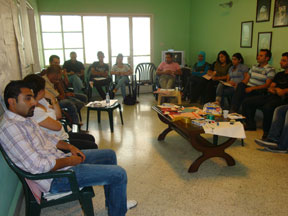
Peace Ambassadors attending the launch of “Eye on Peace” Project
A homeland still suffering from devastating wars, thousands killed and displaced, homes demolished, youth emigrating, and mothers crying, a homeland where thousands triumph but many more lose, where many controversies exist, where peace and war nest and embrace, in this homeland, in Lebanon, the Development for People and Nature Association (DPNA), a secular NGO, carried out the project “Peace Ambassador,” targeting 18-25 year olds from both sexes.
DPNA trained these youth and built their capacities in conflict resolution, tension reduction, and in nurturing the culture of peace by highlighting the importance of dialogue and the need to accept the others. It is designed to make them ambassadors of peace in their communities and among their peers.
“Young people discovered that what separate them are problems inherited from others, and not problems of their own; and that what brings them together is much more than what divides,” said Peace Ambassador's Project Manager Mona Hassouna.
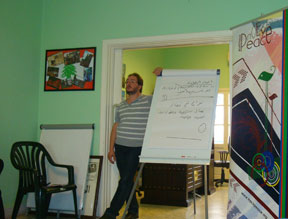
Launch of “Eye on Peace” Project
One project participant, Farah Abu Sel, said she gained skills and abilities that changed the way she deals with people. “That inspired me to work on introducing peace-related themes in school programs,” she added.
Peace Ambassador was completed in February 2010, having trained 300 young leaders from all Lebanese regions, universities, parties and NGOs. In spite of some political obstacles, its managers were committed to deliver their peaceful message. Once the initiative worked well, they launched “Eye on Peace,” a magazine that showcases Peace Ambassadors' success stories and promotes a new tolerance-based education as a step forward in promoting peace.
By Maryam Sleiman, UNIC Beirut
Don’t be afraid… Kfarsama is your home!
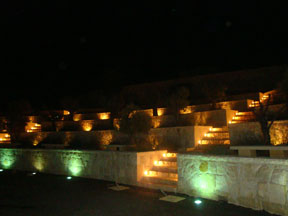
Kfarsama Amphitheatre
“It’s a blessing to be born in a family,” said Mgr Mansour Labaki, a priest, an apostle of peace on earth with an angelic face who refused not to confront life’s hardships and difficulties. The 1975 Damour massacre had shaken him into deciding later to create the Village of Peace- Kfarsama in Mechmech, a village in the Lebanese mountains.
“My experience has shown me that the Lord blesses all bold attempts, and risks are sanctioned,” says Mgr Labaki. After the horrendous massacre, the priest brought together 33 orphans, both Muslim and Christian and mostly children of army martyrs, and took them to France where they spent eight years. At his own expense, Mgr Labaki secured them full boarding and education, and finally brought them back to Lebanon to pursue their schooling.
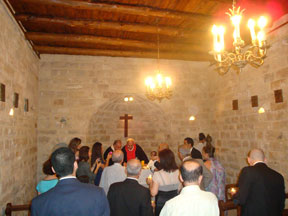
One of the churches in Kfarsama, where people can practice their
religious rituals
From the depths of that horrible wound that weighed down on the hearts of thousands of homeless people because of continued destruction and bombing, from the screams of children of injustice and others that are sold and prostituted, from the tragedy of children suffering sickness and starvation, from here, a Lebanese estate dawned, the Village of Peace, inspired by “Kfarsama”, a book written by Mgr Labaki that was turned into a theatre play in which famous actor Jean Piat performed, Kfarsama became a refuge for those who suffered in their lives, and those whose hearts were deprived of peace, and those whose sense of belonging to the land, family and home was uprooted by wars.
Mgr Labaki made Kfarsama his rosary, converting children into Peace Builders after childhoods dispossessed of dreams, and fostering a generation nurtured on the culture of forgiveness and peace, with a strong multi-ethnic basis.
As an example for those who didn’t learn yet from the pains and wounds of war, Mgr Labaki is propagating an inexhaustible peaceful culture so that the flame of “Peace” remains the strongest.
By Maryam Sleiman, UNIC Beirut
Championing for Peace in Kirkuk, Iraq
Under the theme of “Love and Peaceful coexistence is the basis for peace in Kirkuk”, a one-month youth sports and education programme was organized in Kirkuk and came to a close on 21 August 2010, in the presence of students, parents and the community at large.
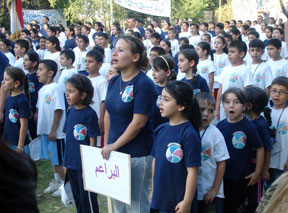
A festive ceremony was held to celebrate the end of an exciting, successful and vibrant programme aiming to promote and educate the youth on values of tolerance, peaceful existence and unity among all ethnic and religious groups in the city.
Organised by the Evangelical Church in Kirkuk, and held annually for the past five years, this year’s event was remarkably significant as 300 children between the ages of 5 and 16 years of age participated in the programme. With guidance and dedication from 40 trained volunteers, these children represented the Arabs, Kurds, Turkmen and Christian ethnic groups. Pastor Haitham Jazrawi, in his opening remarks said, “Our children are valuable for us, and they are the future. Tolerance, justice and love among brothers and sisters is necessary for peace and prosperity in Kirkuk, and indeed for Iraq”.
Amidst an atmosphere of joy, laughter and harmony, various activities including sports tournaments, skits, poetry and story-telling and educational debates on the themes of peace, security, development and reconstruction were organised. The children learned the value of unity and tolerance by working in teams. Through active participation, they engaged in inspiring debates on how peace, education and security can aid in development and increase opportunities. Some students expressed their hopes of becoming engineers, teachers, doctors and nurses “so that we can help the sick, the poor, and the elderly and build our country. We will return next year with more ideas to share with the friends we have made here today”. By Waseem Wastin, UNAMI
A Little Peace Picnic
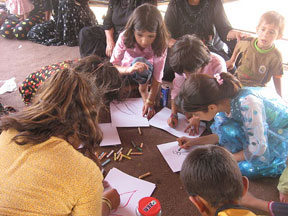
A dozen of young men and women from various civil society organizations initiated a new approach to peace by organizing a one-day picnic for hundreds of Internally displaced peoplein Bastasen Internally Displaced Persons (IDP) camp near Qaladzae town, northwest Sulaymaniya province of Iraq’s Kurdistan Region, in July 2010. The activists took with them a big tent, pots of traditional Kurdish yaprakh food, fruits and vegitables enough for the whole community, boxes of colouring pencils for their children and also ideas about peace and its necessity for development to discuss with the elders and the youth alike.
As the tent was set up with help from the welcoming young IDPS, the children lined up to receive colouring pencils and drawing notebooks. The pictures they drew depicted vivid memories of burnt orchards and destroyed houses, but also memories of a safe haven that their villages were and the hope that they would be restored as the big playgrounds they used to be. The drawings were collected and were mounted inside the tent, with the youngest artist officially declaring the exhibition open by cutting a ribbon amid applause from encouraging parents who seemed to have just realised how talented their children were.
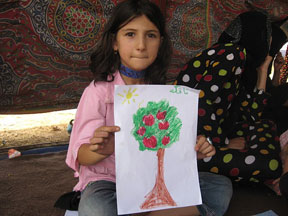
Over the simple but hearty lunch that was served, the IDP community, youth and elderly, man and women, openly engaged in discussions about peace and candidly expressed their views on rehabilitation, development and what they need to enjoy a brighter future.
“We wanted to give a chance to the IDP community to be heard, we wanted them to know that their views matter and their voices need to be heard, we wanted the children to feel like children and enjoy a day of fun” said Namo Sharif, one of the organizers of the picnic.
By sunset, the civil society activists left the camp with the promise to come back for another visit and to bring with them biryani – another traditional Kurdish dish - to celebrate Eid-al Fitr and the end of the holy month of Ramadan.
By Sabah Abdulrahman, UNAMI
A survivor's Answer to Violence: Help Iraqi Youth Build Peace in Iraq
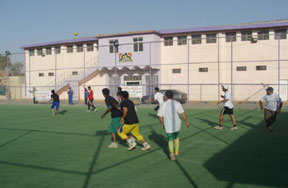
Rania Hadi, a 24 year-old Iraqi young woman, is a miracle survivor of one of Baghdad’s horrendous bombings in April of 2006. As soon as she recovered from the serious injuries that left her on a wheelchair for an entire year, she joined the Iraqi Amal [Hope] Association that helped her, together with relief organizations, undertake medical treatment in Jordan. Rania has since been involved in a wide range of activities undertaken by the Association throughout Iraq, including combating all forms of violence and discrimination, promotion of the culture of human rights and human security and training courses for women, children and youth so that they can participate effectively in public life.
Rania participated in many activities of the Association but the one initiative she cherishes the most is the organization of the first soccer game in 2009 under the slogan "Through Peace, we build our country and solve crises" between youth from two Baghdad communities that had contentious relations. “Soccer is very popular in Iraq and there is nothing better than a friendly sports competition to help people realize what peace would mean for all Iraqis. The years of conflict in the country deprived us from enjoying the simplest pleasures in life”, Rania said. “The seed we planted had borne fruit and we are still organizing soccer games for these two communities and, more importantly, the youth involved have succeeded in building strong friendships and have been active ambassadors for the cause of peace and reconciliation within their respective communities”, Rania added.
“It is a simple initiative but one that helps my people cherish the gift of life and work together to build a peaceful Iraq where all Iraqis can simply enjoy a game, sit in cafe, go to school or to their workplace without fear and running the risk of being a victim of a terrorist attack. Surrendering to terror is not an option we can afford”, Rania said with the determination she hopes she can instill in Iraqi youth.
By Randa Jamal, UNAMI
Young Researchers – Our Year, Our Voice
As part of a programme sponsored by UNICEF and Al Nayzak for Extracurricular Education, 350 adolescent young researchers were selected to carry out research projects in East Jerusalem.
One group of students tested tap water and water from this Silwan spring for bacteria and other impurities, producing a public awareness film of the results. 16-year old Raed Abu Sirreyeh completed research on early marriage and, after tabulating 200 questionnaires from adolescents in East Jerusalem, found that poverty, limited education, and parents early marriage all make marriage before 18 more common.
The UNICEF supported young researchers initiative, funded by the Norwegian Government, provides adolescents the opportunity to choose their research topics that are of their own concern, design questionnaires, carry out research and initiate action.
The initiative seeks to foster the participation of adolescents in improving knowledge management to initiate change on issues impacting their lives, which is implemented in seven districts across the occupied Palestinian territories.
For more information and to view a photo essay, please visit: http://www.unicef.org/oPt/6230.html
Through play, UNICEF helps restore a semblance of normalcy to Gaza’s children
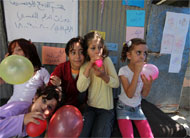
Gaza, August 2010 - Even though Israel’s 23-day-offensive in Gaza took place over 18 months ago, fear still echoes through the voices of the children of Ezbet Abed Rabbo, a tiny community north of Gaza, near the border with Israel. Nine-year-old Rawan Saleh grows quiet and her voice trembles. “They pushed us out of our houses,” she remembers. “We were in the house five days when they announced over loudspeakers that we had to leave. And they took my father.”
“This area was all built up, but now it’s a wasteland – it’s natural for them to be afraid,” says Psychosocial Team Leader, Shaima Talib. “Bring up anything about the war and the kids change – they start to remember the shooting, the shelling, the death. That’s why we try to bring them back to a life of play and ordinary things.” Talib’s team is one of 16 Psychosocial Support Teams operating in Gaza and the West Bank with support from UNICEF and funds from the European Commission and the Canadian International Development Agency.
Services are implemented by the Palestinian Center for Democracy and Conflict Resolution (PCDCR). The teams are composed of up to 25 community-based psychologists, educators and legal counsellors who are trained to provide psychosocial support to children and caregivers. The programme also allows field workers to detect serious cases of trauma and refer these children to professionals who can provide more specialised care and services. In 2009, the programme reached over 37,000 children and 14,000 caregivers with direct support, and trained over 800 psychosocial support professionals.
On a recent Thursday morning, 14 children, seven girls and seven boys played basketball, handball and other games. The activities are held in an open space provided by a resident of Ezbet Abed Rabbo whose home was destroyed during ‘Cast Lead’. He has managed to rebuild a few rooms from scrap bits of metal and concrete, but the remaining area is reserved for the neighbourhood children. Such community participation is built in to the project, under way since last year, as a way to build resilience at the community level.
“The children have remarkable resilience and an immense thirst for playing and learning.” says UNICEF Child Protection Specialist Mioh Nemoto. “It has become especially important, after ‘Cast Lead’, to try to bring semblances of childhood back into their lives.”
“We play and we benefit,” says 10-year-old Hamada Muheisen. His own memories of the war are equally stark. “We would sit close to each other and hold each other close,” he recalls gravely. “I was afraid from the war, from the shooting,” he explains. “I wanted to stay close to my mother. My brother and sister were very afraid, and my sister wouldn’t even go to the bathroom by herself.” Nine-year-old Rawan recalls days in her house under fire without food or water. An uncle who braved the shooting to bring the family milk for its babies was ultimately shot and killed, she says.
Approximately 1,400 Palestinians were killed in the operation, including 350 children. Four Israeli civilians and 10 soldiers were killed in combat or as a result of rocket and mortar fire. The effects of the war have been prolonged, aid workers say, by an Israeli blockade on Gaza that has prevented the import of many basic goods and raw material that is needed for reconstructing homes and vital infrastructure. Despite the recent easing of entry of goods into Gaza, few houses have been rebuilt, as Gaza lacks the cement and steel needed to reconstruct on a wide scale.
According to the United Nations Development Programme, only 25 per cent of the damaged incurred during “Cast Lead” was repaired in the following year, much of it by local recycling of rubble and debris. Caught in the middle, the needs of the children of Ezbet Abed Rabbo are at once complex and very basic. “When we play it allows us to forget the days of the war,” Rawan says. “When we go to the camp, we forget.”
For more information, please visit: http://www.unicef.org/oPt/media_6237.html
Green Action / Peace Oil – Israeli-Palestinian Fair Trade

Green Action is an Israeli non-governmental organization which advocates for environmental activism and social change, and has brought Fair Trade and organic Palestinian olive oil to the Israeli market.
The olive oil is also sold in bulk worldwide, including to Australia and the U.S. In America, Olive Branch Enterprises of Seattle, Washington, buys Green Action in bulk and bottles it under the label Peace Oil.
Green Action works with Palestinian farmers in the Salfit region of the West Bank. They help the farmers organize into cooperatives, improve the quality of the olive oil to export standards, obtain organic and fair trade certification, and harvest the olives. Green Action buys the olive oil for distribution in Israel and worldwide.
Through the project, the Palestinian farmers have been able to market their Fair Trade Extra Virgin Olive Oil made available on Israeli shelves. Avi Levi, the fair trade advocate for Green Action, is one of few Israelis (other than settlers and soldiers) who regularly travel in the West Bank. The products are packaged under the SAHA label. SAHA is the Hebrew acronym for fair trade and the Arabic word for “health” or “wellbeing”. Green Action‘s SAHA project brings together uniquely environmental and political issues promoting community trade between Palestinians, Israeli Arabs and Israeli Jews.
In Israel and Palestine, fair trade is a unique part of the movement for peace as an opportunity for positive interaction and expression of solidarity through trade. The purchase of SAHA products directly supports the people who are most affected by the occupation and ongoing conflict—small farmers and producers from marginalized communities on both sides.
For more information, visit http://www.fairtrade.org.il or http://www.peaceoil.net/index.htm
Let Kids be Kids
Op-ed by Chris Gunness
Spokesman for the United Nations Relief and Works Agency
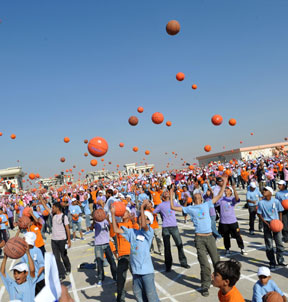
UN Photo/Shareef Sarhan
This week thousands of kids in Gaza romped into the Guinness Book of Records for the third time. Some seven thousand children simultaneously flew kites on a beach in northern Gaza, more than doubling the previous record they themselves set a year ago. As if this weren’t enough, just one week before, no less than 7,203 children went to the destroyed airport in Gaza and bounced their way into the Guinness Book of World Records by simultaneously dribbling basket balls for five minutes. Two world records in just one week, three in a year is surely another world record in itself.
These two events engendered iconic images which were emblazoned across the blogasphere and media outlets, old and new, in Gaza, Israel in beyond. Behind them lay a beautiful and inescapable symbolism. Here were thousands of children, grouping together co-operatively and creatively with one single ambition in mind, smiling and laughing as they worked in wrapped concentration, in an act of celebration and achievement to be number one in the world. Here was the next generation in Gaza demonstrating to the outside world that given the chance, they could show their true potential, just like kids anywhere. Such symbolism will surely not have been lost on the millions of people around the world who so sadly have become accustomed to the imagery of destitution and hopelessness that usually emanates from the Gaza Strip.
The world record breakers were part of the Gaza Summer Games organized by the United Nations Relief and Works Agency. In nearly one hundred and fifty locations across Gaza over a six week period, some quarter of a million children have been taking part in sporting, recreational and cultural activities. This is the fourth Summer Games season organized by UNRWA and for the fourth successive year, thousands of UNRWA teachers have given up their summer holidays to allow the children of Gaza simply to have fun like children anywhere in the world; to have a sense of normality despite the abnormality they face in their daily lives following the fighting a year ago and the bitter legacy it has left behind.
The subtext was clear for all to see. UNRWA gives to the children in Gaza a chance to achieve their full human potential and when allowed to do so, their energies can be channelled into world class achievement. Though Gaza often grabs the headlines, it is often forgotten that everyday in hundreds of schools throughout Arab countries and territories surrounding Israel, UNRWA likewise helps some half a million children achieve their full potential. With over twenty thousand teachers working in some seven hundred schools, empowering the next generation across the Middle East, education remains the key priority for UNRWA, to which the Agency devotes more than half its financial resources.
But UNRWA does so against odds which are both financial and logistical. The Agency has a shortfall in its budget for this year alone of about one hundred million US dollars. Services across the region are under threat, with all the worrying implications for stability in the Middle East. In Gaza the restrictions on humanitarian goods mean that we have been unable to build any new schools, let alone repair old ones for years. Over ninety per cent of our schools there are “double shifted” which means that though there may be one physical building, the school actually serves two completely different sets of pupils and staff. Our classes in Gaza have swollen to as many as 45 children per class.
Unable to build schools for an expanding population, we have been turning away thousand of five and six years olds whose parents want them to receive an UNRWA education. Today, 39,000 children are being denied a United Nations education in Gaza and are instead being absorbed by the education system of the local authorities. The restrictions looks set to have profound consequences for the next generation right on the door step of Israel. And with so many dozens of school that need to be built and many more repaired, the prospects for change this look dim.
But all is not lost. UNRWA remains steadfastly committed to its human development goals, assisting hundreds of thousand of children in one the world’s most unstable regions achieve their full potential, giving them a sense of self respect, of self reliance and a belief in a peaceful and dignified future. However, UNRWA does not operate in a vacuum in Gaza. We are educating children eventually to enter a job market where there is over forty per cent unemployment. Over three thousand businesses have gone under in the last three years alone, years which have seen a once thriving export economy decimated. An educated, unemployed population in Gaza is in no one’s interests. The economy must be revived. Exports have to be allowed out of Gaza if the next generation is to be given the full rights to employment, enabling self-reliance as communities, ultimately leading to the creation of a prosperous and stable society.
The time has come for vision. The world needs to look to those iconic images from the UNRWA Summer Games as pointers to where the future could lie for the next generation in Gaza and beyond.
For more information, please visit: http://www.unrwa.org/etemplate.php?id=766

